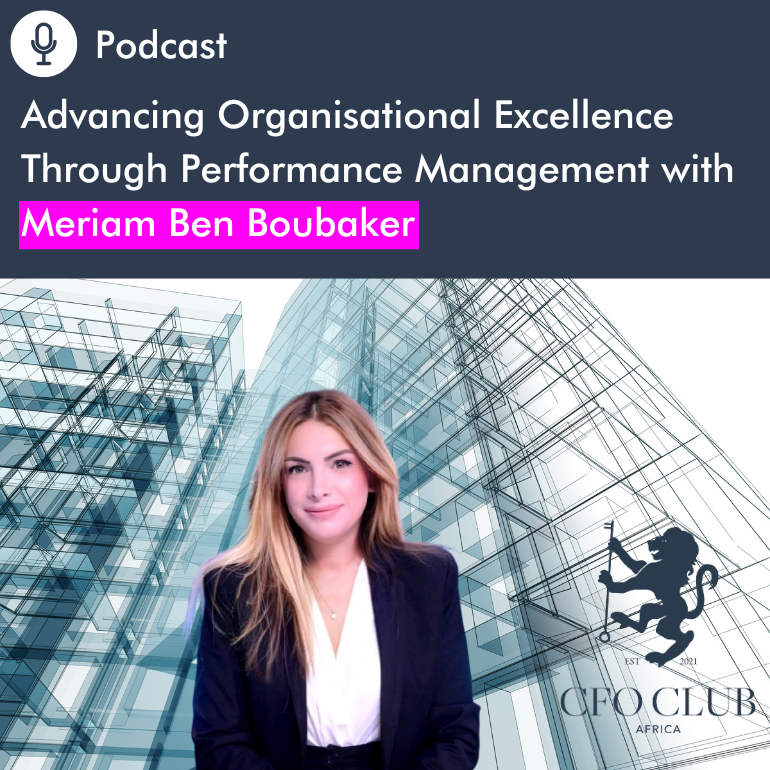Advancing Organisational Excellence Through Performance Management with Meriam Ben Boubaker
Redefining Performance Management in a Globalised Economy
In an increasingly interconnected and sustainability-driven economy, performance management has become far more than tracking financial KPIs. It now demands a strategic, forward-thinking approach that incorporates digital transformation, sustainability, data-driven insights, and human leadership.
On this episode of the CFO Club Podcast, we sat down with Meriam Ben Boubaker, Vice President of the International CFO Alliance (ICFOA) and Director of Management Control at a major public organisation. With over two decades of experience, Meriam offered a deep dive into the Performance Management Working Group’s mission, the tools they’ve developed, and how finance professionals globally can future-proof their performance frameworks.
From KPIs to ESG: The Expanding Scope of Performance Management
Meriam explains how performance management has moved beyond traditional metrics to incorporate sustainability, digitalisation, and innovation. CFOs today are expected to:
- Align economic performance with environmental and social responsibility.
- Use advanced technologies like automation and analytics to enhance decision-making.
- Anticipate and respond to regulatory shifts, particularly in sustainability reporting.
A recent CFO Club blog on The Rise of ESG Reporting reinforces this view: “CFOs are now expected to guide their organisations through ESG integration, turning compliance into competitive edge.”
The Barometer: A Benchmarking Tool That Transforms Practice
One of the flagship projects led by Meriam’s group is the International Performance Management Barometer (BIPP)—a strategic benchmarking tool created in partnership with AXYS. With 2,500+ respondents from 24 countries, it offers a global and national lens into current trends, gaps, and leading practices.
Case in Point:
A mid-sized logistics firm in Morocco used the BIPP to benchmark its financial resilience and non-financial reporting practices. They discovered that their peers in France were already embedding sustainability KPIs into quarterly performance reviews. Inspired by this, they introduced a dual-reporting framework aligned with GRI standards, boosting their ESG rating and securing a strategic partnership with a European client.
ESG as Strategy, Not Obligation
One of the biggest challenges, Meriam notes, is reframing sustainability not as a compliance burden, but as a strategic advantage.
“Sustainable finance should not be seen as a constraint but as a catalyst for long-term value creation,” she says.
To help companies integrate sustainability into performance frameworks, ICFOA is launching a Green Accounting Guidebook (in partnership with AXYS) in September 2025. The guide will offer practical steps for CFOs to align their ESG metrics with broader strategic goals.
Case Study Highlight:
A South African manufacturing firm adopted green accounting after engaging with ICFOA. They began measuring carbon intensity per unit of production and embedded it into executive scorecards. Within one fiscal year, the company reduced its emissions by 11% and attracted green funding from a European impact investment fund.
The Human Element: Leadership in Transition
Beyond systems and frameworks, people remain central to transformation. That’s why ICFOA has partnered with IMT to support CFOs through the human and managerial transition in finance leadership.
The upcoming Human Leadership & Managerial Transformation Conference in 2025 will focus on:
- Developing agile leadership mindsets
- Embracing uncertainty and complexity
- Building change management capabilities
Meriam references the book Lessons from a Century of Life by Edgar Morin, which urges leaders to use uncertainty as a lever for innovation. It’s a powerful reminder that performance excellence isn’t just about what we measure—but how we lead.
Global Collaboration Through Strategic Events
To drive continued collaboration and innovation, ICFOA—together with Jabra—will host three international CFO events in 2025 across South Africa, France, and Italy. These gatherings will address:
- The digital workplace and remote team management
- Smart communication and collaboration platforms
- Financial leadership in an AI-enhanced environment
These events are built to foster peer exchange, enabling CFOs to learn from one another across borders and sectors.
Looking Ahead: Future-Proofing Finance
ICFOA’s 2025 roadmap includes:
- Release of BIPP results on 4 October 2025
- Publication of the Green Accounting Guidebook
- Thought leadership events focused on ESG and human transformation
For CFOs, these initiatives present not just learning opportunities—but strategic levers for leading high-performing, resilient organisations.
Final Takeaway: Learn, Benchmark, Transform
Meriam’s closing advice is simple yet profound: “We can make a better future—together—if we are united and more responsible.“
As finance leaders face mounting pressure to deliver both performance and purpose, tools like the BIPP, green accounting frameworks, and peer collaboration platforms become essential. Whether you’re working on your ESG reporting or rethinking your leadership style, the resources from ICFOA are designed to support you every step of the way.
Transcript:
Host: Leana van der Merwe, CIBA Technical Specialist
Guest: Meriam Ben Boubaker, Vice President of the ICFOA
Leana:
Good day, listeners, and thank you so much for joining us for today’s CFO Club Podcast. We’ve got another exciting, content-packed session lined up, and we’re thrilled to have you with us.
Today’s episode focuses on advancing organisational excellence through performance management. We are honoured to welcome a distinguished leader who brings a wealth of expertise in performance management, finance, and sustainability.
Before introducing our guest, I’d like to acknowledge the International CFO Alliance (ICFOA).
ICFOA is a global network connecting CFOs and finance leaders across all industries and countries. It fosters international collaboration and shared learning, playing a crucial role in promoting and advancing the CFO profession while addressing key financial and strategic challenges worldwide.
With that in mind, we are delighted to welcome Meriam Ben Boubaker, Vice President of the ICFOA. Meriam is a seasoned expert with over 20 years’ experience in performance management, information systems, and corporate social responsibility. As Director of Management Control at a major public company, she has been instrumental in developing management control frameworks and enhancing business performance.
Beyond corporate leadership, she’s actively involved in organisations that promote financial excellence, sustainable development, and professional education. Today, Meriam will share valuable insights into how the Performance Management Working Group of the ICFOA is helping businesses enhance efficiency, drive sustainability, and make better strategic decisions.
Meriam, we’re privileged to have you with us. Welcome to the CFO Club Podcast.
Meriam:
Thank you so much, Leana, for this opportunity.
Finance is more than an economic tool—it’s a powerful lever to transform societies. It shapes faith in business resilience and builds a more equitable and sustainable future. We must understand that finance isn’t just about numbers—it’s about impact. It has the power to drive change, create value, and shape a more sustainable future.
Leana:
Thank you so much, Meriam. I couldn’t agree more.
To start our conversation today, can you tell us about the mission and strategy of the Performance Management Working Group at ICFOA?
Meriam:
Absolutely. The Performance Management Working Group at ICFOA aims to support companies and finance professionals in improving their practices.
Today, performance management goes beyond traditional financial indicators. It must integrate innovation, digitalisation, and sustainable finance to ensure long-term, responsible growth.
Our work focuses on several key pillars:
- Innovation in performance management: We integrate new technologies and advanced methodologies to improve decision-making.
- Support for CFOs: We provide tools that help align economic performance with social responsibility, including ESG criteria.
- Knowledge sharing: We create platforms for discussion and provide strategic resources to help CFOs anticipate future transformations.
Leana:
Thank you for that detailed explanation.
How does the Performance Management Working Group support businesses in improving their performance management processes?
Meriam:
We provide companies with concrete and strategic tools to enhance decision-making and refine management processes.
In collaboration with AXYS, we launched the International Performance Management Barometer—known as the BIPP. This year, 24 countries participated in the study, with over 2,500 respondents. It offers a global view of performance management trends.
The barometer provides country-by-country analysis, allowing companies to compare their practices internationally. It delivers a dual benchmark—national and international—helping identify best practices and areas for improvement.
We also established a strategic partnership with IMT to support human and managerial transitions in finance in response to ongoing transformations.
Additionally, ICFOA and Jabra have joined forces to host several international events for CFOs and business decision-makers. These events explore challenges related to digital transformation, financial leadership, and evolving workplace dynamics.
Our partnership aims to:
- Create peer exchange platforms for CFOs to share insights and innovative practices.
- Highlight the critical role of CFOs in business evolution.
- Integrate smart communication and collaboration solutions.
These initiatives offer exclusive insights into workplace transformation, flexibility, and the impact of new technologies on business management.
Leana:
That’s exciting! International collaboration and sharing of best practices are so valuable, especially in today’s globally interconnected economy.
Sustainability is becoming a major focus for businesses. What challenges have you encountered when integrating sustainability into performance management frameworks?
Meriam:
Integrating ESG criteria and sustainable finance into performance management is a major challenge. Many companies still prioritise short-term financial results over long-term sustainability.
Our mission is to show—using data—that sustainable finance is a competitive advantage, not a constraint.
However, managing environmental and social impacts remains fragmented due to inconsistent standards across industries and countries.
To address this, in partnership with AXYS, we launched a Green Accounting Guidebook to help companies build structured approaches to sustainability.
As sustainability reporting evolves, new skills are required—leadership and change management in particular. That’s why we’ve partnered with IMT to develop training in these areas.
Recent legislative reforms, like the Omnibus Directive, have significantly impacted how companies report on sustainability. The European Union has proposed simplifying CSRD obligations, but this is more of a logical streamlining than a real simplification. It may reduce pressure on companies but also risks lowering their commitment to real social and environmental responsibility.
Moreover, even non-European companies, including those in Africa, are indirectly affected. They must comply to maintain competitive business relationships with Europe.
Leana:
Thank you, Meriam. I agree—sustainability can be complex, and many finance professionals struggle to integrate it into their business models.
Let’s return to the barometer. What impact has the BIPP had on business efficiency and decision-making? Do you have any success stories to share?
Meriam:
Yes, as I mentioned earlier, the BIPP is more than just an analysis tool. It provides a unique international overview with data from 24 countries.
It enables companies to:
- Benchmark their practices.
- Identify trends to shape performance management.
- Adapt to market changes through data-driven decisions.
It also offers recommendations to help CFOs improve their practices and anticipate industry shifts.
The annual Confidence in Numbers Conference is a key moment for discussing BIPP findings and exploring actionable strategies for better performance management.
Leana:
That’s fantastic. What upcoming initiatives or projects can members of the Performance Management Working Group look forward to?
Meriam:
We’ve got several exciting initiatives lined up:
- 4 October 2025 – Our next conference to present BIPP results and discuss the role of finance in the sustainable transition.
- September 2025 – Publication of our Green Accounting Guidebook, developed with AXYS, to assist CFOs in building ESG reporting approaches.
- Human Leadership and Managerial Transition Conference, in partnership with IMT, focusing on rethinking financial leadership in times of transformation.
- Three international events with Jabra, to be held in South Africa, France, and Italy. These will explore Salesforce, digital, and managerial transformation.
Ultimately, our ambition is to support CFOs in every aspect of performance management through insights, tools, and strategic discussion platforms.
Leana:
That sounds like a very active and impactful year ahead!
One final question: For finance professionals looking to deepen their understanding of performance management, is there a specific book or piece of literature you recommend?
Meriam:
Yes, I recommend Lessons from a Century of Life by Edgar Morin. I’m not sure if it’s been translated into English, but its message is universal.
In this book, Morin—a centenarian sociologist and philosopher—shares life lessons that encourage resilience in the face of today’s challenges.
In business, this perspective is critical. Rather than seeking absolute certainty, we should accept uncertainty and use it as a lever for innovation and agility.
In a constantly changing world, adaptability is key to success. Morin’s work encourages us to embrace complexity and uncertainty, transforming challenges into opportunities and boosting organisational resilience.
Leana:
Thank you so much, Meriam. I’m sure many of our listeners will be inspired to find a translation or summary of the book—AI can certainly help with that nowadays!
Before we wrap up, are there any final thoughts you’d like to share with our CFO Club members?
Meriam:
Thank you again for the opportunity. I just want to say that we can build a better future together—if we remain united and take more responsibility.
Leana:
Thank you, Meriam. And thank you for highlighting the critical work being done by the ICFOA to support and unite CFOs globally. We live in a time when international collaboration is more possible—and more essential—than ever.
To our listeners, thank you for joining us. Be sure to tune in for future episodes—we’ll have more conversations with ICFOA members.
Meriam:
Thanks, Leana. And thanks to the CFO Club Podcast.





